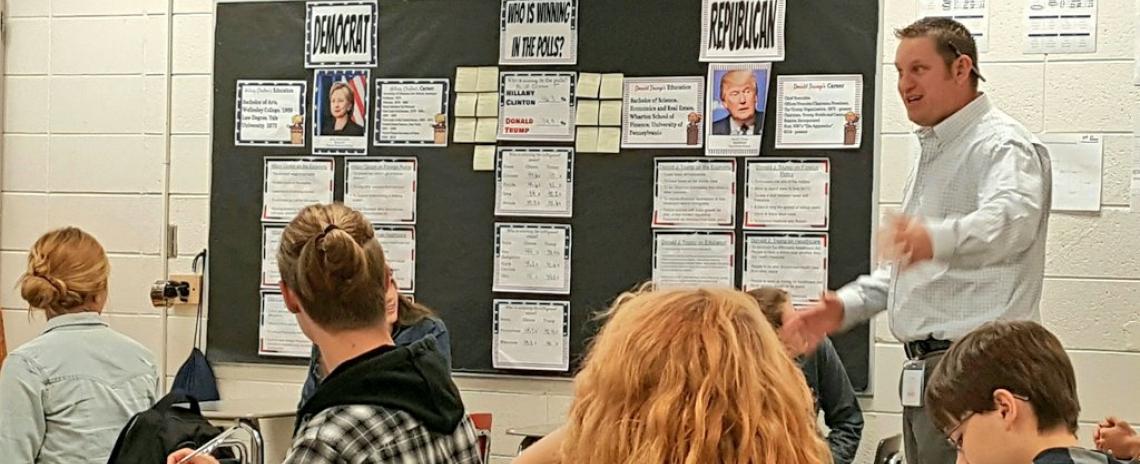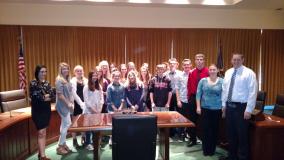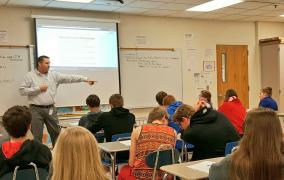Norris teacher goes extra mile to inform, engage government students
Norris teacher goes extra mile to inform, engage government students
By Tyler Dahlgren
NCSA Communications Specialist
Activeness over apathy. That’s the message Norris High School government teacher Scott Harrington tries to convey to his students every day.
Finding a way to entice a class full of teenagers into developing an interest in the operations of local government is no simple task. It’s a mighty important one, however, and that’s why Harrington goes above and beyond in his efforts to engage his students at Norris.
“It’s very important for the kids to become active,” the 11th-year instructor said. “If you can positively influence the kids to become active instead of apathetic, then you’re doing your job.”
If Harrington were to become complacent, then his students might fall in line.
“Not showing up detracts from the purpose of the government,” Harrington said.
It’s that purpose that Harrington works so hard to familiarize his students with. Through visits to the State Capitol, where speakers lined up by Harrington through connections he’s formed the last handful of years, Norris government students get a first-hand look at the ground floor of local government.
On October 18th, Harrington’s class of about 20 Titans spent a day strolling through the Capitol, hearing from a handful of speakers including Senator Roy Baker, Chief Deputy Attorney Dave Bydalek, 2012 NHS graduate Nick Devine (who spoke on civic engagement), Judge Riko Bishop and Governor Pete Ricketts.
“It’s important to bring people in that deal with it every day and let them see how things are done,” Harrington said. “A real big purpose of what I like to do with the field trip, especially by having someone like Nick, who the kids know and who still has siblings at Norris, is to show them how easy it is to get involved.”
Before Devine, Nebraska Council of School Administrators Executive Director Dr. Michael Dulaney spent over half an hour speaking about legislation and lobbying. Harrington, after finishing his administration degree, first heard Dulaney speak at NSCA’s Emerging Administrator’s workshop. That was about four years ago, when Harrington’s field trip idea was first hatched.
“I thought ‘Here’s a guy that knows what he’s doing’, so I contacted him to come speak to my kids about the legislation process and working with the unicameral government,” Harrington said. “I sent out some emails and made some phone calls to people that would be knowledgeable in different aspects of how our local government works, and everything began to fall into line.”
With the help of Senator Baker, the superintendent that hired Harrington at NHS, things started to come together. Harrington’s message to his students stayed steady. His goal of informing and sparking involvement did, too.
“It doesn’t take something special and you don’t have to be a certain somebody to get involved in local government,” Harrington said. “It’s actually quite easy to get involved in the issues that are important to you.”
This fall, in addition to lining up several in-class guest speakers, Harrington is coordinating a student vote designed to prepare his students for their first trip to the ballots. He received election materials, including a ballot box, ballot sleeves and stickers, from the Lancaster County Election Commission, and will set up different polling locations throughout the school.
“Students will officially register and go through that whole process,” Harrington said. “Hopefully through that, they will see and understand the system better once they are of age to vote.”
The role of a high school government teacher is to inform and present both sides, often requiring Harrington to play the role of devil’s advocate during class discussions. With parental and media influence, it can be tough to open a student’s mind to consider the opposing side of an issue.
“If a kid is on one side, I’ll come from the other side just to get them to see the value of the way our government is run and why it’s important to have two parties, if not more, there,” Harrington said.
And when he does spark an interest, when all of his hard work initiates participation from a student that came in to his government class indifferent? That’s the pay-off.
“It feels amazing,” Harrington said. “When you see the kids take an interest and take value, and when you see they’re getting something out of it and they’re changing the way they’re thinking and changing the way they’re going to behave as they become old enough to vote, that’s an awesome feeling.”
The alternative might be easier. Slide shows, text books and episodes of 60 Minutes could project the same ideas and relay the same information.
But Harrington doesn’t plan on taking the easy road any time soon. With a bus full of high school students, the voters of tomorrow, Harrington is going the extra mile and headed towards the ground floor.
“Our government, and the democracy and republic we have, only exists when people are informed and participate,” Harrington said. “If they don’t, then that’s when things can go wrong.”




